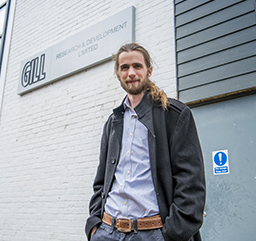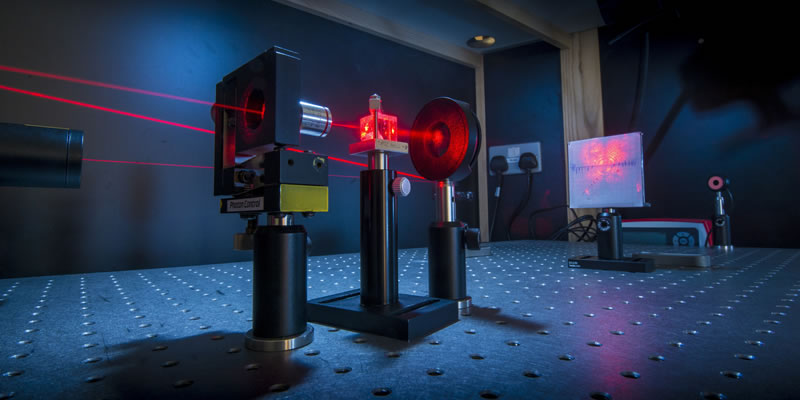Alongside core physics modules, you’ll be introduced to photonics from semester one, learning about the interaction of light and matter and gaining an understanding of lasers and optical fibres. You’ll build on this knowledge throughout the course, spending plenty of time in the lab as well as in lectures. In year two, for example, you’ll explore photonics theory through advanced experiments, developing practical skills while exploring key underpinning concepts.
Through a wide choice of photonics-focused optional modules, including MSc-level modules delivered by the ORC, you can gain a deep understanding of areas of photonics that interest you.
In year four you’ll have the chance to generate new photonics knowledge by undertaking an extended research project in a field that interests you. The breadth of photonics research that takes place here means you’ll have a wide choice of projects, in areas such as:
- the use of photonics in quantum computing
- holography
- high-resolution x-ray for imaging at the nanoscale
- the control of matter with light, for example optical tweezers or the use of lasers in cold-atom physics
- photosensitive materials, liquid crystals and polymers
- optical fibres
- silicon photonics
- fundamental research into light-matter interactions
View the 2019/20 programme specification document for this course
View the 2020/21 programme specification document for this course
Research-grade facilities
You’ll use state-of-the-art equipment in our teaching laboratories, which include a dedicated photonics lab with the latest laser equipment. Expert technicians are on hand to support your experimental work.
You’ll also have the chance to access the ORC’s photonics facilities, which comprise over 100 laboratories including a £120m cleanroom complex and four fibre towers, with capabilities better than any other UK university. As well as seeing fibres being made, you’ll visit high-power laser labs and telecoms labs, giving you a deeper insight into the topics you’re studying.
A top-five research department
Study with us and you’ll join one of the top five Russell Group departments for physics and astronomy research (REF 2014). Our research reputation is built on a track record of discovery and we remain on the frontline of new developments
You’ll be studying in an environment that is rich in photonics research, with an active Quantum, Light and Matter research group within the department and close collaboration with the ORC. You’ll be taught by researchers from both, which means you’ll learn about the latest developments in this fast-developing field.
Accreditation
Our MPhys Physics programmes are accredited by the Institute of Physics
Programme Structure
Throughout the degree you’ll study core physics subjects alongside specialist photonics modules. Optional modules in years three and four give you the freedom to:
- deepen your knowledge in specific areas of photonics
- learn more about closely related topics, such as nanoscience or advanced quantum physics
- strengthen your computing and mathematical skills
- study a physics topic in another field that you’ve always wanted to know more about
You could also broaden your intellectual horizons by learning a language or choosing from a range of innovative cross-disciplinary modules, on topics including law, business and bioengineering.
If you change your mind about your field of study after you arrive, our programme structure makes it possible to switch to the MPhys Physics or BSc Physics degree up until the end of year two. It may also be possible to change to one of the other specialist programmes, provided you’ve taken the required modules.
To Apply
All undergraduate applications for Physics and Astronomy should be made online through the Universities and Colleges Admissions Service (UCAS).
Find out how to apply and get further details about UCAS' website, phone and contact details.
Key Facts
Southampton has a history of revolutionary discoveries in photonics, including developing the optical fibres and amplifiers which make the internet possible
We're the only UK university to offer an undergraduate physics with photonics degree
This degree has close connections with the University's Optoelectronics Research Centre, a global hub for photonics research
You'll graduate with a skill set which will be sought after in the fast-growing photonics industry


